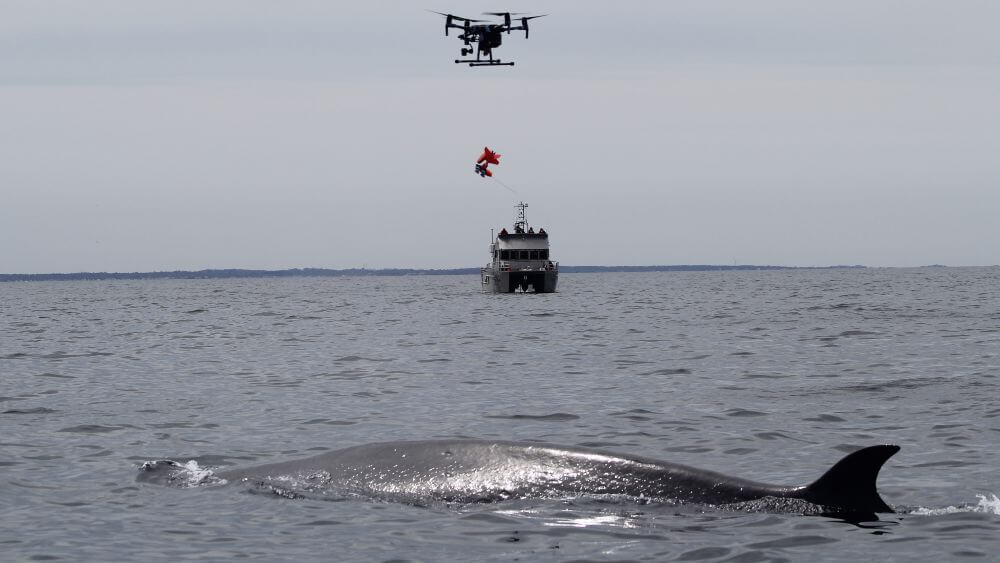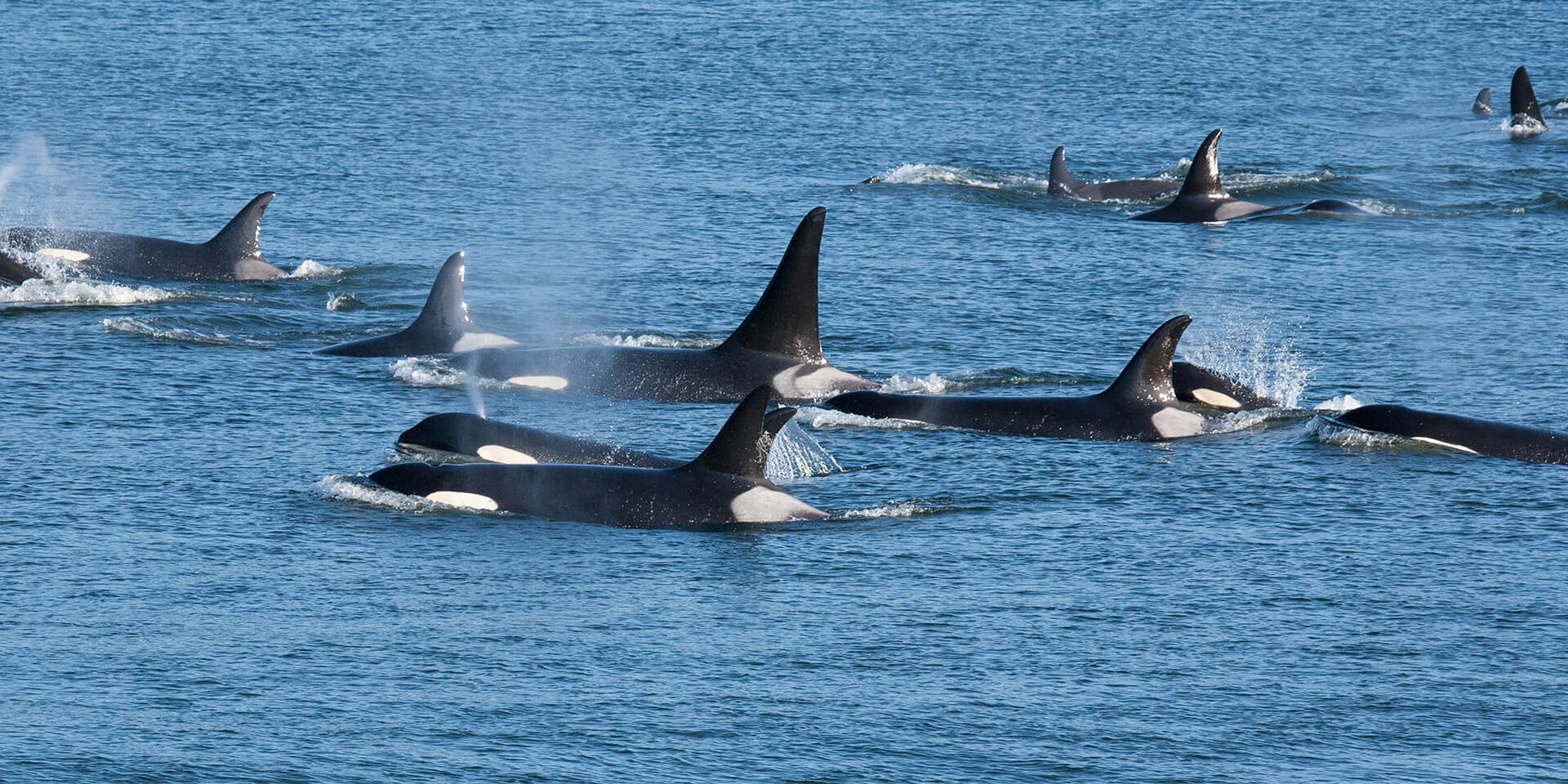2025 Annual Meeting
Emerging Technologies to Improve Efficiency and Support Innovation for Marine Mammal Stock Assessments

A drone is used to drop a tag onto the back of a sei whale. Credit: Laura Howes under NOAA Fisheries Permit #18059.
The Commission held its 2025 Annual Meeting on September 9-11 in La Jolla, California, focusing on emerging technologies to improve efficiency and support innovation for marine mammal stock assessments. Assessing marine mammal stocks gives us valuable information on population trends, productivity rates, estimates of human-caused mortality and other sources of serious injury, and more. These assessments allow us to evaluate the effectiveness of conservation and recovery measures, and to adjust management approaches as needed. The meeting was public and open to all.
Meeting Materials
Click here for a PDF copy of the draft agenda. The meeting schedule, presentations, recordings, and session summaries are below.
Meeting Recordings
Visit the Commission’s Youtube Channel to watch every session of the meeting.
Day 1: Tuesday September 9
Meeting Opening
- Welcome and Introduction to the Meeting
Peter Thomas, Executive Director, Marine Mammal Commission (MMC)
Session 1 – Eyes in the Sky: Emerging technologies for remote detection and assessment
Moderator: Jason Baker, MMC
- Introduction to session (see video recording)
Jason Baker, MMC - Geospatial Artificial Intelligence for Animals (GAIA)
- Introduction to GAIA
Christin Khan, NOAA Northeast Fisheries Science Center - Open-Source Preprocessing Workflow for Maxar’s Level 1B Satellite-Imagery to Enhance Detection & Identification of Marine Mammals
Kim Goetz, NOAA Alaska Fisheries Science Center
- Introduction to GAIA
- Estimating Minimum Population Size from Satellite Monitoring
Tony Fischbach, USGS Alaska Science Center - Satellite Detection of Whales
Darcy Bradley, The Nature Conservancy - Satellites to study live and stranded whales: How satellite imagery is giving insights for whale conservation (see video recording)
Penny Clark, British Antarctic Survey - Afternoon Break
- Eyes in the Sky Panel Discussion
Panelists in Additions to Presenters:
- David Johnston, Duke University
View Session Summary
Day 2: Wednesday September 10
Session 2 – Reducing Impact through Innovation: Innovative and less-invasive sampling methods for health and population assessment
Moderator: Randall Wells, Brookfield Zoo Chicago’s Sarasota Dolphin Research Program and MMC
- Session introduction and latest on remote tag deployment with the TADpole
Randall Wells, Brookfield Zoo Chicago’s Sarasota Dolphin Research Program and MMC - UAS-based deployments of suction cup attached biologging tags
Chris Zadra, Ocean Alliance - Development of a minimally-invasive blood collection device for cetaceans
Cynthia Smith, National Marine Mammal Foundation - Harnessing emerging technologies for a non-invasive approach to marine mammal energetics
Michelle Shero, Woods Hole Oceanographic Institution - Advances in eDNA monitoring of marine mammals: Current capabilities and future directions
Ryan Kelly, University of Washington - What can epigenetics tell us about aging and health of marine mammals?
Ashley Barratclough, National Marine Mammal Foundation - Morning Break
- Reducing Impact through Innovation Panel Discussion
View Session Summary
Session 3 – Connecting the Dots: Innovative and integrated quantitative methods for assessing populations
Moderator: Aaron Thode, UC San Diego Scripps Institution of Oceanography and MMC
- Introduction (see video recording)a
Aaron Thode, UC San Diego Scripps Institution of Oceanography and MMC - Understanding North Atlantic right whale abundance and distribution through data fusion
Rob Schick, Southall Environmental Associates Inc. and Duke University - Advancing acoustics for integrated population assessment
Kait Frasier, UC San Diego Scripps Institution of Oceanography - Integrating multiple information types to improve estimates of large whale entanglement mortality and serious injury
Jeff Moore, NOAA Southwest Fisheries Science Center - Modelling population consequences of multiple stressors: from individual response to population dynamics
Leslie New, Ursinus College - Afternoon Break
- Connecting the Dots Panel Discussion
View Session Summary
Day 3: Thursday September 11
Session 4 – Regional Updates: Hot Topics in the California Current Ecosystem
Regional Updates: Hot Topics in the California Current Ecosystem Session Recording
Moderator: Karin Forney, NOAA Southwest Fisheries Science Center and MMC
- Wrap up of previous sessions: challenges to transitioning to emerging technologies and why there is an ongoing need for established approaches; followed by an introduction of regional updates (see video recording)
Karin Forney, NOAA Southwest Fisheries Science Center and MMC - Using climate-ready information in decision making for multiple stakeholders
Elliot Hazen, NOAA Southwest Fisheries Science Center - Collaborative approaches to addressing whale entanglement
Ryan Bartling, California Department of Fish and Wildlife - Monitoring the status of eastern North Pacific gray whales
Aimée Lang, NOAA Southwest Fisheries Science Center - Morning Break
- Are we in a new era of marine mammal mortality events associated with harmful algal blooms in California?
Clarissa Anderson, Southern California Current Ocean Observing System (SCCOOS) and UC San Diego Scripps Institution of Oceanography
View Session Summary
Public Comment and Meeting Adjournment
Please feel free to contact us with any questions or feedback.
